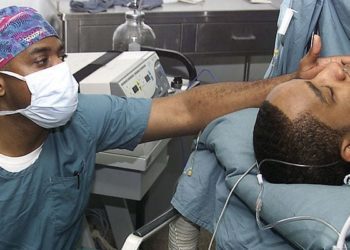Better cardiorespiratory fitness in young adulthood improves long-term outcomes
1. Based on the Coronary Artery Risk Development in Young Adults (CARDIA) study, cardiorespiratory fitness (CRF), as measured by an exercise treadmill test, was strongly associated with long-term outcomes. For each extra minute of baseline exercise test duration, there was a 15% lower risk of death from any cause, and 12% lower risk of cardiovascular disease.
2. Short term decreases in CRF, as measured by a repeat exercise test at year 7, was also associated with long-term outcomes. Each one-minute reduction in stress test duration at 7 years compared to baseline was associated with a 21% increase in all-cause mortality and 20% increase in CVD, both at long term follow up.
Evidence Rating Level: 2 (Good)
Study Rundown: Cardiorespiratory fitness (CRF) level of middle aged and older adults has been associated with cardiovascular disease (CVD) outcomes. However, the same has not been studied for young adults. This study, which used the cohort from the Coronary Artery Risk Development in Young Adults (CARDIA) study, was done to identify the relationship between CRF in young adults and its relation to the CVD risk later in life. CRF fitness was measured based on the results of an exercise treadmill test. The results of the study showed that each extra minute of baseline exercise test duration was associated with a 15% lower risk of death from any cause, and 12% lower risk of CVD. A short-term decrease in CRF, as measured by a repeat treadmill test at year 7, was also associated with long-term outcomes. Each one-minute reduction in exercise test duration at 7 years compared to baseline was associated with a 21% increase in all-cause mortality and 20% increase in CVD, both at long term follow up.
The major strength of the study was the long-term follow up and relatively good retention rate of the cohort. The cohort was also relatively generalizable amongst the American public, though minorities (outside of African Americans) were not strongly represented. Given the observational nature of the study, there were still likely confounders that were not accounted, which can decrease the validity of the results.
Click to read the study, published today in JAMA Internal Medicine
Relevant Reading: Long-term effects of changes in cardiorespiratory fitness and body mass index on all-cause and cardiovascular disease mortality in men
In-Depth [prospective cohort]: The cohort for the CARDIA study was initially recruited from 1985 – 1986, and consisted of 5115 young adults aged 18-30 years old (mean age 24.8 years). Participants were chosen from four US cities. Follow up of participants took place at 2, 5, 7, 10, 15, 20, and 25 years (cohort follow up ended in 2011). There was about a 72% retention rate by the end of the study period. An initial exercise treadmill test was performed at the first visit, and a second one performed at seven years (for part of the cohort). Those with any cardiovascular or structural heart diseases were excluded from the treadmill test. Structural heart parameters via echocardiography and coronary artery calcification (CAC) scores were measured at early and late time points. Main outcomes analyzed were all-cause mortality and cardiovascular events. There was a median follow-up of 26.9 years.
After adjusting for demographics and other confounders, each additional minute of exercise test duration was associated with lower risk of death (HR 0.85; 95% CI, 0.80-0.91) and a lower risk of CVD (HR 0.88; 95% CI, 0.81–0.96). Exercise duration was not associated with CAC scores at long-term follow up, however. Each additional minute of exercise duration was also associated with reduced absolute LV mass and better global longitudinal strain (a measure of subclinical dysfunction). Additionally, short term decreases in exercise capacity (as measured from a repeat exercise test at year 7) related to long-term increase in all-cause mortality (HR 1.21; 95% CI, 1.07–1.37) and incident CVD (HR 1.20; 95% CI, 1.06–1.37).
Image: PD/CDC
©2015 2 Minute Medicine, Inc. All rights reserved. No works may be reproduced without expressed written consent from 2 Minute Medicine, Inc. Inquire about licensing here. No article should be construed as medical advice and is not intended as such by the authors or by 2 Minute Medicine, Inc.









